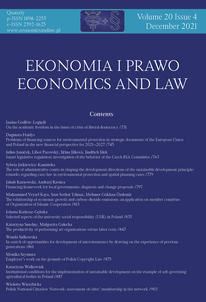Financing framework for local governments: diagnosis and change proposals
Financing framework for local governments: diagnosis and change proposals
Author(s): Jakub Karnowski, Andrzej RzońcaSubject(s): Public Administration, Public Finances, Fiscal Politics / Budgeting
Published by: Wydawnictwo Naukowe Uniwersytetu Mikołaja Kopernika
Keywords: local governments; decentralization; transfers; tax competition; spending efficiency; local cohesion; access to public services;
Summary/Abstract: Motivation: The best way to widen access to public services at the local level is to increase efficiency of local government spending. However, an increase in efficiency may refer to output or inputs. In the latter case it does not widen access to public services. Moreover, factors conducive to spending efficiency may be detrimental to local cohesion. Finding a way so that the financing framework for local governments would reconcile the efficiency condition with the conditions of access to public services and local cohesion respectively, is an issue of great importance for economic policy. It seems to be so especially in a country like Poland, where there are large differences in the level of development between regions for historical reasons. These differences, if left accumulating, could easily jeopardize efficiency due to distorted capital flows, not to mention political tensions they may cause. Aim: The article aims at identifying basic features of the financing framework for local governments in Poland that hinder efficiency of their spending and at proposing feasible changes to that framework that would improve the efficiency but not at the expense of local cohesion or access to public services. Results: The article argues that the financing framework of local governments in Poland would better meet conditions of both efficiency and access to public services, if local governments relied mostly on revenues from income taxes instead of transfers from the central government, and some elements of tax competition between local authorities, although restricted to PIT-free allowance, were introduced. Such a shift in local governments revenue composition would not weaken local cohesion, if it was accompanied by an appropriate solidarity subvention financed by the richest voivodeship and the central government, and non-recurring central government revenues were allocated to investments exceeding financial capacity of local governments
Journal: Ekonomia i Prawo. Economics and Law
- Issue Year: 20/2021
- Issue No: 4
- Page Range: 797-812
- Page Count: 16
- Language: English

